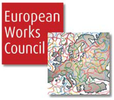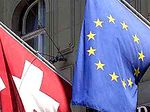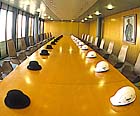 |
|
Welcome to issue no. 2 / 2013 of EWC News. July 2013
|
|
The
Academy for European Works Councils (EWC Academy)
EWC
News appears four times a year.
You can find past issues in the newsletter archives.
|
|
1.
EWC
legislation: Arbitration ruling in London
|
|
First ever decision on the consultation procedure in the United Kingdom
The recent decision is not very encouraging for employee representatives. The case was filed by Nigel Haines from Lisbon in his capacity as European works council co-chairman at the British Council, a non-profit organization for the promotion of international relations with offices throughout the world (similar to the Goethe-Institute in Germany). According to the EWC, in the context of a planned restructuring, central management had;
Background to the case
The British Council’s European works council was established in 2006 following unsuccessful negotiations for the conclusion of a EWC agreement. The default EWC continues to operate today on the basis of the subsidiary requirements of the British EWC legislation (TICER), similar to the EWC of the easyJet airline (see report in EWC News 3/2012). Certain matters which are normally components of a EWC agreement were later regulated in writing with central management – a similar situation to the German Railway company “Deutsche Bahn” between 2005 and 2012 (see report in EWC News 2/2012). An additional “EWC Code of Practice” was developed with central management in 2009 including a schedule for consultation procedures and a communications’ flow diagram.
When it became known on 1 August 2012 that a pilot project for performance based remuneration for teachers in Ukraine was to be exported to Romania, the EWC filed legal proceedings on 7 August 2012. The EWC feared a gradual change in the entire remuneration structure throughout the EU and identified shortcomings in the consultation procedure for restructuring in foregoing months. Central management rejected all the allegations and opened an intensive discussion process with the EWC on the basis of documents going far beyond minimum legal standards.
The CAC ruling
What lessons can be learned from this?
1. With its Code of Practice, the British Council EWC is already a few steps ahead of many other European works councils. In the context of the new European Union directive it can be very useful to clearly define the structure of the consultation procedure in detail – including flowcharts. However it is not sufficient just to put this down in writing. To be legally enforceable, it should be integrated into the EWC agreement.
2. Such a legal case is not at all conceivable without the very detailed and conscientious documentation of meeting minutes and emails. The proceedings before the CAC were actually based only on documented facts without an oral hearing.
3. Although the EWC lost this case, other works councils should not be discouraged from taking legal action in London. Such close co-operation, as in the British Council, between central management and the EWC, is not generally the rule in Anglo-American companies. Central management from other companies must first of all attain this standard, before they can hope for a victory in court. A benchmark has consequently been set for future disputes.
Upcoming event on the subject |
|
2.
Handling confidential information
|
|
French industrial tribunal stops consultation procedure
Justification for the court’s decision: documents submitted to the central works council at the beginning of the information procedure, on 2 October 2012, were classified as “strictly confidential”. Employee representatives could therefore not discuss the full details of the planned restructuring with the workforce. The judges ruled that the strict confidentiality was abusive. Almost 1,000 jobs are to be lost and the Toulouse site completely closed. Following texts are available only in French: While this ruling is only directly relevant to French works councils, it nevertheless throws a light on the consultation procedure in European works councils. Is such a decision also conceivable for a EWC? Can EWC members at all carry out their consultation duties, if they can only share limited information with national works councils or with the workforce? Who decides which documents are confidential or not confidential according to objective criteria?
The German EWC legislation refers to this in Article § 35: "The members and substitutes of a European works council are obliged not to use or reveal any business or professional secrets, which have been given to them as a member of the European works council and which have been expressly classified as confidential by central management … the obligation does not apply toward other members of the European works council. Furthermore it does not apply toward local employee representatives…, nor to the employee representatives on supervisory boards…"
The obligation of confidentiality does not apply for the fulfillment of union duties
Confidentiality is particularly an issue in Anglo-American oriented companies. Employee representatives are often bound to utmost secrecy through very restrictive clauses in the EWC agreement. The European Court of Justice passed a ruling in 2005, allowing the communication of confidential information for the fulfillment of work-related duties. The legal dispute concerned whether employee representatives on supervisory boards could inform their trade union about a forthcoming merger (see report in EWC News 3/2009).
Upcoming event: Seminar on confidentiality
|
|
3. Better employee participation in France
|
|
Hundreds of employee representatives soon on supervisory boards
Although, with the new legislation, France is still far behind the parity-based participation rights in Germany (photo), there has not been such a substantial development in employee participation rights in Western Europe since the 70's. In the future all companies with more than 5,000 employees in France (and/or more than 10,000 world-wide) must include employees on their administrative or supervisory boards with full voting rights. There are one or two seats allotted depending on the size of the board. The first seat is always allotted to the French works councils, and the second elected by the European works council. As is the case of the European Company (SE) this can be a representative from another country. The new rules concern the largest French companies (around 200).
So far there have only been employee representatives with full voting rights in government majority-owned companies, or in those privatized in recent years. If there are employee shareholders they also have a right to a seat. Up to now, in the private sector, employee representatives participate on administrative or supervisory boards mainly in a consultative capacity. Since all these mandates will remain in place, in the future actually four, six or more employee representatives will often participate in the meetings, even though not all with voting rights.
Top management remuneration under stronger scrutiny
Corporate business made this voluntary commitment under the threat that the government would otherwise pass appropriate legislation. The Code of Practice contains a chapter dedicated to employee participation in Corporate Governance bodies. Each employee representative has hereby a right to training in the future. One employee representative will systematically sit on the remunerations committee which fixes executive officers salaries. Following texts are available only in French:
First slight majority for reform-oriented trade unions
For a collective agreement to be valid, the contracting trade unions must totalize at least 30% of the works council election votes at the corresponding level of application. To topple a collective agreement, the challenging trade unions need 50% of the votes. Since there has been a slight shift in the last three years in favor of the moderate trade unions (+2%), the more militant trade unions CGT and CGT-FO together totalize only 48.8% of the votes. They can therefore no longer legally challenge any collective agreement on a national level. In particular this also applies to framework agreements with the government, which for example gave rise to the new employment-security legislation.
|
|
4. Reports from other
countries
|
|
Hungary: No more protection against dismissal for works council members
The new labour code also reduces works council and trade union rights. From now on, only the chairperson of the works council has a protection against dismissal and all other members are no longer protected. The time-off work allowance for trade union representatives has also been reduced and the time-off entitlement for seminars completely cut. The protection against dismissal of Hungarian European works council representatives is now unclear. According to article 10-3 of the EWC Directive they “shall, in the exercise of their functions, enjoy protection and guarantees similar to those provided for employees’ representatives by the national legislation …. in force in their country of employment”. Since simple members of a Hungarian works council no longer have any protection against dismissal, Hungarian EWC members are consequently also no longer protected – unless they are the chairperson of a Hungarian works council.
Trade unions address the consequences
One of the major difficulties of Hungarian trade unions is their low membership levels and strong fragmentation. Only 14% of all employees are trade union members and there are six competing confederations. On 1 May 2013 three of these confederations announced a planned merger. They represent about two thirds of all union members in Hungary. Complaint
from Belgian government
on German social dumping
  On 18 March 2013 the Belgian
government filed a complaint against Germany with the European
Commission in Brussels. Beforehand labour and economics ministers were
able to make their own assessment of working conditions in
slaughterhouses in Lower Saxony. The Belgian meat industry had brought
the matter to the attention of its government, since it is no longer
competitive as a result of wage dumping practices in Germany. It was
criticized for the lack of minimum wages and the employment of East
European workers in unworthy conditions. On 18 March 2013 the Belgian
government filed a complaint against Germany with the European
Commission in Brussels. Beforehand labour and economics ministers were
able to make their own assessment of working conditions in
slaughterhouses in Lower Saxony. The Belgian meat industry had brought
the matter to the attention of its government, since it is no longer
competitive as a result of wage dumping practices in Germany. It was
criticized for the lack of minimum wages and the employment of East
European workers in unworthy conditions.Local government in Lower Saxony wants to support Belgium and in this way make pressure on Berlin. "The low wage country Germany has become a job-killer in many of the adjacent countries such as Belgium”. EFFAT, the European Federation of Food, Agriculture and Tourism trade unions has also demanded that the German government put an end to social dumping. Discussions between the German NGG trade union and large slaughterhouse groups, in an attempt to find a solution, broke down on 27 June 2013.
  Croatia becomes the 28th member
state of the European Union Croatia becomes the 28th member
state of the European UnionThe former Yugoslav constituent republic, Croatia, has become a full member state of the European Union since 1 July 2013. The negotiations for accession began in October 2005 together with Turkey. The country has 4.5 millions inhabitants and the third-highest unemployment rate in the EU of 23%, after Spain and Greece. A lot of foreign investments come from Austria and Italy is the most important trade partner. Apart from tourism shipbuilding also plays a major role. The largest foreign owned company is the former state-owned telephone company. With 6,000 employees it now belongs to Deutsche Telekom and operates under the name T-Hrvatski Telekom (see report in EWC News 1/2012). Before its entry, Croatia had to transpose all social policy European Union Directives into national legislation. This included also the Directives on European works councils and on participation in the European Company (SE). All existing European and SE works councils have therefore now to accommodate for Croatian representatives. |
|
5. New initiative
in the
European Parliament
|
Coming
closer to legislation on
transnational company agreements  Following the historical
decision of the European Parliament on 15 January 2013 to demand a
pan-European legislative initiative on socially responsible management
of restructuring (see report in EWC
News 1/2013), another spectacular legislative initiative is
in the making. In a meeting held on 20 June 2013 in Brussels, the
European Parliament committee on employment and social affairs voted
favorably on a report from the German MEP, Thomas Händel, on
the legal safeguarding of transnational company agreements.
Händel belongs to the parliamentary group of the European
United Left and was a trade union officer of IG-Metall from 1979 to
2009. The vote gave a surprisingly large majority (31 votes for, 6
against, 3 abstentions), which means that the report is very likely be
adopted in a plenary session of the European Parliament in the second
half of 2013. Following the historical
decision of the European Parliament on 15 January 2013 to demand a
pan-European legislative initiative on socially responsible management
of restructuring (see report in EWC
News 1/2013), another spectacular legislative initiative is
in the making. In a meeting held on 20 June 2013 in Brussels, the
European Parliament committee on employment and social affairs voted
favorably on a report from the German MEP, Thomas Händel, on
the legal safeguarding of transnational company agreements.
Händel belongs to the parliamentary group of the European
United Left and was a trade union officer of IG-Metall from 1979 to
2009. The vote gave a surprisingly large majority (31 votes for, 6
against, 3 abstentions), which means that the report is very likely be
adopted in a plenary session of the European Parliament in the second
half of 2013.The Händel report includes the following points:
The European Commission has also been working on the subject, and since 2005 already. It recently submitted a working paper in September 2012 and has started consultations (see report in EWC News 3/2012). Although the number of transnational company agreements is constantly growing there is strong resistance against such legal regulation from the employer’s side. Whereas in the beginning there were "soft" topics such as equality between men and women, further training or occupational safety, now increasingly "harder" restructuring questions are becoming the object of such agreements. So far there is however no security on their legal enforceability. There is also controversy as to who should carry out negotiations and sign the agreements: the European works council (German model) or the trade unions (French model), or both. A recent research project from the Hans Böckler Foundation shows: "French dominated EWCs tend to
leave negotiations up to the European industry federations and
to national trade unions. German employee representatives often
consider rather the EWC to be a central player."
A strong coordination role for European Trade Union Federations must rely on well staffed full-time structures. Since this is less and less the case, the European works councils negotiate themselves, a situation which is reflected in the figures from the Hans Böckler Foundation: out of the 75 agreements examined, 61 were signed by a EWC and only 21 by European Trade Union Federations. Works councils sidelined and without legal protection This empirical evidence is not however reflected in the Händel report. The majority of agreements existing today are purposefully excluded from the legislative initiative and so continue to be legally unprotected. Furthermore there is no mention anywhere of the demand from many German works councils for the European works councils to evolve towards codetermination. Preference is clearly being given to the French model (in a similar way to the EWC Directive already). The disregard for German codetermination in Brussels is even more surprising, since at the same time the special advantages of German participation are increasingly appreciated in France and are the object of reform (see report above). |
|
6.
Consultation in collective redundancies
|
|
Highest Court of Justice in Madrid strengthens Spanish works councils
On 20 March 2013, the Spanish Supreme Court of Justice passed judgment for the first time, under the controversial labour legislation reform from February 2012. On the grounds of incomplete works council consultation, collective redundancies were invalidated at Talleres López Gallego, a construction company in the industrial town of Móstoles, near Madrid. According to the judges, the works council should have the possibility to develop alternatives to the layoffs. This means that detailed documentation on the company’s economic situation is necessary. The cancellation of the layoffs follows the French model, whereby any unilateral measures taken by the employer with an incorrectly conducted or incompletely finalized consultation procedure are null and void (see report in EWC News 4/2009).
The
ruling has strong political significance. The conservative
government’s labour legislation reform passed by emergency
decree in February 2012 to combat the financial market crisis, contains
the most substantial restrictions to labour legislation since the end
of the Franco dictatorship. Trade unions reacted to it with protest
demonstrations lasting for weeks and a general strike (see report in
EWC News 2/2012). With record high unemployment of
over 25% these reforms have created a climate of Manchester capitalism
and lawlessness in Spain, which is now being countered by the Supreme
Court of Justice.
Highest Court of Justice in Riga weakens Latvian employee representation
  British
government halves consultation period British
government halves consultation periodIn the United Kingdom the consultation period for collective redundancies involving more than 100 employees has been fixed since 6 April 2013 to 45 days. Previously layoffs could only take place after 90 days. Despite this 50% reduction, the delay is still longer than in Ireland, where it generally amounts to only 30 days. The legislative changes are part of a long-term package of labour legislation reforms, which the Department of Business, Innovation and Skills (BIS) has planned for the coming months. ACAS, the independent arbitration board has released revised guidelines on the consultation procedure. |
|
7.
New
SE works councils and revised EWC agreements
|
|
Hannover Rück establishes SE works council and avoids parity-based supervisory board
As previously, employees delegate three German members to the supervisory board (1/3 participation). However a parity-based supervisory board is not established when the threshold of 2,000 employees in Germany is passed. The SE agreement only makes provisions for open-ended discussions leading to mutually accepted changes. If the discussions break down, 1/3 participation remains in force. The reinsurance company hereby jumps on the bandwagon of typical German SE company conversions which aim at restricting employee influence in supervisory boards in terms of figures.
Fuchs Petrolub establishes SE works council and avoids parity-based supervisory board
The future SE works council is made up of ten members from seven countries. A further nine countries have no representatives due to the very limited number of employees and are co-represented by other countries. Europe excluding Germany has consequently been divided into three regions. A similar solution was already developed in 2008 for the Hamburg based tesa adhesive tape manufacturer (see report in EWC News 4/2008). Following texts are available only in German:
Swiss Pharmaceuticals Company adopts new EWC Directive
The steering committee is made up of eight members and meets three times a year. The EWC can furthermore establish working groups, which likewise may meet up to three times annually. On the other hand, plenary sessions take place only once per year. The new EWC agreement also documents in detail the consultation procedure for the case of restructuring. Central management guarantees to implement measures only once the procedure has been completely finalized. A particularly high emphasis is given explicitly to occupational safety. One particularity is the inclusion of references not only to European Union Directives, but also to ILO conventions and OECD guidelines as a basis for cooperation. The labour courts are not competent for disputes but the International Chamber of Commerce in Vienna is responsible for conciliation.
 The renegotiation of EWC agreements will be the subject of a legal seminar held in Berlin on 9 and 10 October 2013.
We have arranged a selection of EWC agreements on a website for download.
|
|
8. European company agreements à la française
|
|
Occupational Well-being
  On 23 May 2013 social partners
in Lafarge, the French building materials group, concluded a
European-wide agreement on occupational well-being as an addition to
the common declaration on occupational health and safety from June 2011
(see report
in EWC News 3/2011). It covers topics ranging from
responsible management of restructuring, employee recognition in the
workplace, teamwork through to work-life balance. The agreement
contains also a list of "best practices" and some health indicators. On 23 May 2013 social partners
in Lafarge, the French building materials group, concluded a
European-wide agreement on occupational well-being as an addition to
the common declaration on occupational health and safety from June 2011
(see report
in EWC News 3/2011). It covers topics ranging from
responsible management of restructuring, employee recognition in the
workplace, teamwork through to work-life balance. The agreement
contains also a list of "best practices" and some health indicators.  EWC role in change management
defined EWC role in change management
definedAn agreement on social guarantees for Air France-KLM ground and service personnel was concluded on 12 June 2013 at the Paris Roissy airport between the EWC and central management. The offices abroad and sales organizations have been seriously affected by the increasing number of electronic transactions such as on-line check-in and e- or mobile-ticketing. In the agreement central management commits itself to communicate transparently on forthcoming restructuring. Furthermore the role of the European works council and the responsibilities of national employee representatives are defined as well as coordination between both levels, which represents one of the requirements of the new EWC Directive. Priority is given to measures on job-security. As a pilot project the agreement will automatically expire on 1 April 2014, if there is no new agreement. The EWC was established after the two airlines merged in 2006. |
|
9. From
framework agreements
to World works councils
|
| First framework agreement in the
private gambling sector
French EWC strengthens relations with Japan
For the first time in the current term of office the steering committee has designated a person responsible for extra-European contacts and who has already met with employee representatives from Tunisia, Morocco, India and Mexico. These efforts are aimed at later establishing a World works council. Axa is one of the world’s largest insurance groups and has one of the best EWC agreements in France (see report in EWC News 2/2009). Italian energy group establishes World works council
|
|
10.
Interesting websites
|
|
Unilever European works council
UniCredit
European works council
  The European works council of
UniCredit, the Italian banking group, is present at three different
addresses on the Internet. A presentation on the company website
introduces the body under the heading of “Corporate
Governance”. All transnational agreements concluded up to now
(see report
in EWC News 2/2009) are also available for download.
Both the CGIL and FABI trade unions have put in place their own
Internet presentations of the UniCredit EWC. The European works council of
UniCredit, the Italian banking group, is present at three different
addresses on the Internet. A presentation on the company website
introduces the body under the heading of “Corporate
Governance”. All transnational agreements concluded up to now
(see report
in EWC News 2/2009) are also available for download.
Both the CGIL and FABI trade unions have put in place their own
Internet presentations of the UniCredit EWC.
World-wide solidarity campaigns
First rating agency for working conditions
We have arranged numerous other interesting websites into a collection of links.
|
|
11.
New publications
|
  Trade
unions in a EU-acceding state, Turkey Trade
unions in a EU-acceding state, Turkey
Up to now, the once strong Turkish trade union movement has not yet recovered from its breakup following the 1980 putsch. In this economical boom country on the Bosphore, their influence is hindered by deep ideological rifts, extremely restrictive legislation and very small membership levels. Over and over again there are also reports on the violation of workers’ rights by multinationals. This review from the Friedrich Ebert Foundation analyzes the current situation of Turkish trade unions. A report evaluates trade union legislation which was modified in December 2012 and which in some parts violates international standards. A Turkish Newsletter in German (“Türkei-Nachrichten”) which is published several times a year by the Friedrich Ebert Foundation provides interesting news on the political situation.
  Company Reporting on
non-financial matters Company Reporting on
non-financial mattersThe European Trade Union Institute, (ETUI), published a review in February 2013 which examines the legal environment and practices in company reporting within 28 European countries above and beyond traditional balance sheets and business figures. Is there an open and transparent dialogue on social policy and on the efforts to attain sustainability? A team of experts from the European Commission already started working on the subject in 2011 and subsequently a draft directive has been submitted on 16 April 2013. In the future companies with more than 500 employees will have to make annual reports on their efforts in the domain of human rights, environmental protection, employee rights and anti-corruption measures.
In April 2013 the European Commission published its latest report on the situation of European level labour relations and within the EU member states. It appears to be “increasingly conflictual” in comparison to previous years, as a consequence of austerity measures due to the financial market and euro crises. The report which is published every two years, contains up-to-date figures e.g. on the scope of collective agreements or trade union membership figures and provides an overview of European labour legislation reform since 2010. One chapter is devoted to the situation in Central and Eastern Europe.
This practical handbook on the implementation and monitoring of international framework agreements in multinational companies was released in May 2013. Such agreements (also called IFA) between trade unions and European works councils on the one hand, and corporate management on the other, lay down world-wide minimum social standards. The handbook was produced by EWC members from five companies in the wood and furniture industry as part of an EU-sponsored project. It provides valuable suggestions for employee representatives wishing to conclude or monitor international framework agreements and includes a master plan for integrated IFA management and audit. We have gathered other literature together into a collection of publications.
|
|
12. The EWC Academy:
Examples of our work
|
  Engineering company starts SE
conversion Engineering company starts SE
conversionA Special Negotiating Body (SNB) was established on 24 April 2013 at the headquarters of Inros Lackner in Rostock, an architecture and property development company (photo). In the coming months it will prepare a SE agreement with central management. Inros Lackner was founded in 2004 following the merger of two groups from East and West Germany, and is currently growing throughout the world. The SNB has mandated the EWC Academy as expert.
Adaptation of EWC agreement in French pharmaceuticals group   The
steering committee of the Sanofi EWC met on 14 June 2013 in Berlin, to
identify the needs to adapt its EWC agreement. A list of major points
for further discussion was drawn up with the support of the EWC
Academy. The agreement, concluded in 2005 after several mergers, has
not been modified since that time. The rules of the new French EWC
legislation therefore apply directly to the third largest
pharmaceuticals group in the world, which strengthens the negotiating
position of the EWC. The
steering committee of the Sanofi EWC met on 14 June 2013 in Berlin, to
identify the needs to adapt its EWC agreement. A list of major points
for further discussion was drawn up with the support of the EWC
Academy. The agreement, concluded in 2005 after several mergers, has
not been modified since that time. The rules of the new French EWC
legislation therefore apply directly to the third largest
pharmaceuticals group in the world, which strengthens the negotiating
position of the EWC.In some respects the current Sanofi agreement provisions already go beyond the new EWC Directive standards, in particular the number of meetings and representatives. Although Sanofi did not opt for the European Company (SE) legal structure, five employee representatives from three countries sit on the company management board in an advisory role. A legal change in France, which specifies that, in the future employee representatives are to be elected to the management board of large companies with full voting rights (see report above) also requires the Sanofi EWC agreement to be adapted.
  Trans-atlantic social
dialogue? Trans-atlantic social
dialogue?
For the first time a seminar was held on this subject on 5 and 6 June 2013 in Berlin. 14 participants from eight companies met in the American Academy on Lake Wannsee to exchange working experience with US parent companies and/or sites in the USA. Experts presented the current situation of labour relations in the USA and gave a brief insight into company strategy and cultural differences. Kenneth Levy, a former public relations spokesman of DaimlerChrysler, Ford and General Motors attended from New York. Michael Fichter from the Free University of Berlin described how Volkswagen is trying to establish a works council in the USA. Ado Wilhelm, a former divisional officer of the German ver.di trade union and supervisory board member of T-Mobile, reported on the US campaign at Deutsche Telekom. Amongst other reports on works council experience was the transfer from the German Siemens group to an American managed company at Corning Cable Systems in Bavaria. A further meeting focusing on the USA is planned for summer 2014 in a similar form. Impressions from other seminars 
|
|
13.
Current training schedule
|
|
The EWC Academy and its forerunner organization have been organizing and delivering conferences and seminars for the members of European works councils, SE works councils and special negotiation bodies since January 2009. So far 503 employee representatives from 202 companies have taken part including many of them for several times. This represents around 18% of all companies in Europe with an established EWC or SE works council. A training schedule brochure for the second half of 2013 is now available for download.   Seminar for EWC members at
Greenwich University Seminar for EWC members at
Greenwich UniversityA
EWC seminar is being held from 3 to 6 September 2013 on the campus of
the Old Royal Naval College in the London suburb of Greenwich (photo).
It consists of three modules, which can each be booked individually:
besides the introduction to German participation for non-German
employee representatives there is the EWC Initiation Seminar for
beginners and an advanced seminar running in parallel under the title:
From a "song and dance act" to a fully-fledged European or SE works
council.
This seminar will be conducted in English and simultaneous interpretation for other languages is available on request. Once a year the same seminar also takes place in Germany on Montabaur Castle, the next time however being first in autumn 2014 (following regular works council elections in Germany).   Works council conference EU -
Switzerland Works council conference EU -
SwitzerlandFor the first time a conference for employee representatives is being held from 11 to 13 September 2013 in Zurich on the incorporation of Switzerland into European works councils. The Swiss workers’ participation act will also be covered. The conference is of special interest to works councils whose companies have sites in Switzerland or to those who have important management functions there.
Seminar on EU legislation in Luxembourg   A
legal seminar for works council members is being held from 23 to 27
September 2013 on confidentiality and data protection. Who defines
which information is to be classified secret? And which confidential
information may be passed on to whom? The processing of personal data
and the EU data protection Directive will also be covered. The agenda
also includes a visit to the European Court of Justice (photo). A
legal seminar for works council members is being held from 23 to 27
September 2013 on confidentiality and data protection. Who defines
which information is to be classified secret? And which confidential
information may be passed on to whom? The processing of personal data
and the EU data protection Directive will also be covered. The agenda
also includes a visit to the European Court of Justice (photo).
  EWC legal seminar EWC legal seminarA seminar organized in Berlin on 9 and 10 October 2013 will cover the new EU legislation on European works councils as a basis for the renegotiation of EWC agreements. Topics will also include the legally refined procedures by mergers, spin-offs or relocation of company headquarters ("changes in structure"). Current legal proceedings on EWC matters will also be on the agenda.
International works council conference in London   A
conference is being held for the third time already in London on 24 and
25 October 2013. The meeting will be simultaneously interpreted. It is
particularly addressed to European works councils members who fall
under British jurisdiction and to employee representatives wishing to
familiarize themselves with the British system. A
conference is being held for the third time already in London on 24 and
25 October 2013. The meeting will be simultaneously interpreted. It is
particularly addressed to European works councils members who fall
under British jurisdiction and to employee representatives wishing to
familiarize themselves with the British system.Language courses: Business English for German-spoken works council members The next language training course will take place from 27 to 30 January 2014 in Hamburg and an additional course on 6 to 12 July 2014 in the English sea-resort Eastbourne. In-house events Please find a summary of possible topics for in-house events here: |
|
14. Imprint
|
|
EWC News is published by:
EWC Academy GmbH Rödingsmarkt
52, D-20459 Hamburg
Authors collaborating on this issue: Werner Altmeyer, Katharina Barrie, Rita da Luz Distributor of the German version: 19,225 readers Distributor of the English version: 2,974 readers Distributor of the French version: 2,927 readers
Newsletter archive: www.ewc-news.com
We are always pleased to receive comments and suggestions in relation to this newsletter as well as reports on your EWC activities. Please write us at: info@ewc-academy.eu
|





















